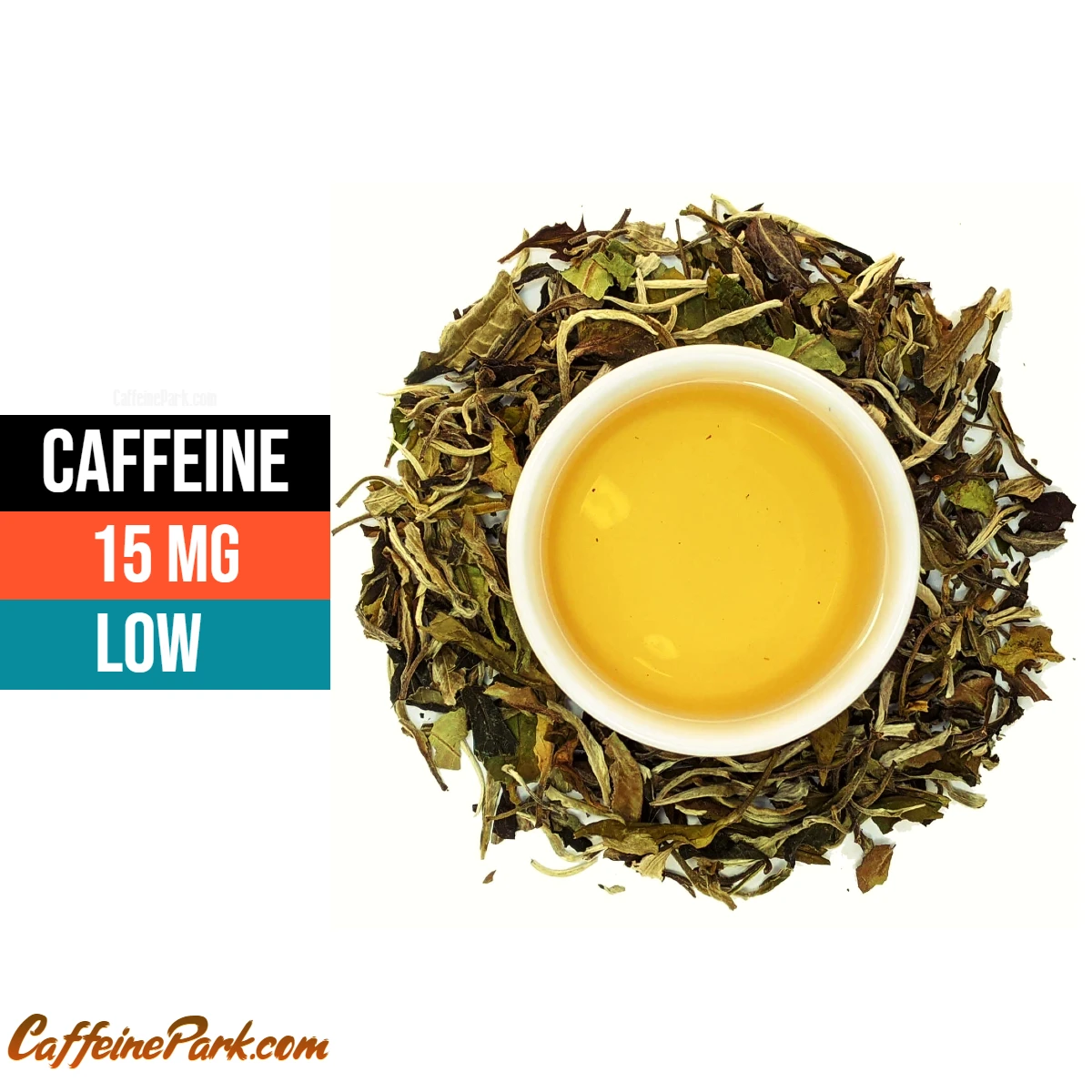Pai Mu Tan tea Caffeine Content

Hey there, tea lovers! Are you looking for a light and delicate tea that won’t leave you feeling jittery? Well, you might want to give Pai Mu Tan tea a try. In this article, we’ll explore the caffeine content of Pai Mu Tan tea and why it might be a good option for those looking to reduce their caffeine intake. So, sit back, relax, and let’s dive in!
Pai Mu Tan tea, also known as White Peony tea, is a type of Chinese tea that is made from the Camellia sinensis plant. It’s a lightly oxidized tea, which means that the tea leaves are allowed to wither and dry before they are processed. This results in a delicate flavor and aroma that is appreciated by tea lovers around the world.
Does Pai Mu Tan Tea have Caffeine?
Yes, Pai Mu Tan tea does contain caffeine, but the amount is relatively low compared to other caffeinated beverages like coffee or black tea. You can expect no more than 15 mg of caffeine per 8-oz cup of Pai Mu Tan tea.
However, it’s important to note that the caffeine content can vary depending on factors such as brewing time and temperature. If you’re particularly sensitive to caffeine, you may want to experiment with brewing methods to find a way to reduce the caffeine content even further.
Certainly! Here’s a chart that shows the approximate caffeine content in different serving sizes of Pai Mu Tan tea:
| Serving Size | Approximate Caffeine Content |
|---|---|
| 1 cup (8 oz) | Up to 15 mg |
| 1 mug (12 oz) | Up to 22.5 mg |
| 1 small pot (20 oz) | Up to 37.5 mg |
| 1 large pot (32 oz) | Up to 60 mg |
It’s important to note that these are only approximate values and the actual caffeine content can vary depending on factors such as brewing time and temperature. Additionally, different brands of Pai Mu Tan tea may have slightly different caffeine content.
Compare Pai Mu Tan Caffeine vs other
Here’s a comparison of the caffeine content in Pai Mu Tan tea versus some other common beverages:
| Beverage | Serving Size | Approximate Caffeine Content |
|---|---|---|
| Pai Mu Tan Tea | 1 cup (8 oz) | 15 mg |
| Green Tea | 1 cup (8 oz) | 20-50 mg |
| Black Tea | 1 cup (8 oz) | 47 mg |
| Coffee | 1 cup (8 oz) | 95 mg (drip) |
| Espresso | 1 shot (1 oz) | 64 mg |
| Energy Drink | 1 can (8 oz) | 80-300 mg |
| Coke | 1 can (12 oz) | 34 mg |
| Dark Chocolate | 1 square | 8 mg |
As you can see, Pai Mu Tan tea has a relatively low caffeine content compared to coffee, black tea, and energy drinks. However, it does contain more caffeine than some other beverages like dark chocolate. Green tea, which is another popular type of tea, has a slightly higher caffeine content than Pai Mu Tan tea but still less than black tea and coffee.
It’s important to keep in mind that these are only approximate values, and the actual caffeine content can vary depending on factors such as brewing time and temperature. Additionally, different brands of tea and coffee may have slightly different caffeine content.
Factors That Affect Caffeine Content
It’s important to note that the caffeine content in Pai Mu Tan tea can vary depending on a number of factors. For example, the brewing time and temperature can have an impact on the amount of caffeine that is extracted from the tea leaves.
If you want to reduce the caffeine content even further, you can try brewing your Pai Mu Tan tea for a shorter amount of time or at a lower temperature. This will result in a milder flavor but may be a good option for those who are particularly sensitive to caffeine.
Potential Health Benefits of Pai Mu Tan Tea
In addition to its low caffeine content, Pai Mu Tan tea also has a number of potential health benefits. For example, it’s rich in antioxidants, which are compounds that can help protect your cells from damage caused by free radicals.
One study found that Pai Mu Tan tea had a higher antioxidant capacity than green tea, which is often touted for its health benefits. This suggests that Pai Mu Tan tea may be an even more potent source of antioxidants.
Another potential benefit of Pai Mu Tan tea is that it may help lower your risk of certain chronic diseases. For example, one study found that drinking white tea (of which Pai Mu Tan is a type) was associated with a lower risk of heart disease.
It’s important to note that more research is needed to fully understand the potential health benefits of Pai Mu Tan tea. However, these initial findings are promising and suggest that drinking Pai Mu Tan tea may be a good addition to a healthy lifestyle.
Side Effects of Pai Mu Tan Tea
Pai Mu Tan tea is generally considered safe for most people when consumed in moderation. However, like any other tea, it may cause side effects in some individuals, especially if consumed in large amounts. Here are some potential side effects of Pai Mu Tan tea:
- Insomnia: Pai Mu Tan tea contains caffeine, which is a stimulant that can interfere with sleep if consumed in excessive amounts, especially at night. If you are sensitive to caffeine, it’s best to avoid drinking Pai Mu Tan tea in the evening.
- Digestive issues: Some people may experience digestive issues such as stomach upset, nausea, or diarrhea after drinking Pai Mu Tan tea, especially if they are sensitive to tannins, which are naturally occurring compounds in tea.
- Allergic reactions: In rare cases, some people may experience an allergic reaction to Pai Mu Tan tea, especially if they are allergic to other types of tea or plants in the same family as the tea plant (Camellia sinensis).
- Interference with medications: Pai Mu Tan tea may interact with certain medications, especially blood-thinning medications such as warfarin. If you are taking any medications, it’s best to talk to your healthcare provider before consuming Pai Mu Tan tea to avoid any potential interactions.
- Dehydration: Pai Mu Tan tea, like any other caffeinated beverage, can have a diuretic effect, which means it may increase urine output and cause dehydration if consumed in excessive amounts.
It’s important to note that these side effects are relatively uncommon and typically occur only in individuals who consume large amounts of Pai Mu Tan tea or are particularly sensitive to caffeine. If you experience any side effects after consuming Pai Mu Tan tea, it’s best to discontinue use and consult a healthcare provider if symptoms persist.
Final Thoughts
In conclusion, if you’re looking for a light and delicate tea that won’t leave you feeling jittery, Pai Mu Tan tea might be a good option for you. With its low caffeine content and potential health benefits, it’s a great alternative to coffee or black tea.
Just remember that the caffeine content can vary depending on how you brew your tea. So, if you’re particularly sensitive to caffeine, you may want to experiment with brewing times and temperatures to find a method that works best for you.
Overall, Pai Mu Tan tea is a delicious and healthful beverage that is definitely worth trying. So, go ahead and brew yourself a cup, sit back, and enjoy!
FAQs
As mentioned earlier, you can expect no more than 15 mg of caffeine per 8-oz cup of Pai Mu Tan tea. However, the caffeine content can vary depending on factors such as brewing time and temperature.
Yes, Pai Mu Tan tea can be a good option for people who are sensitive to caffeine. Its low caffeine content makes it a great alternative to other caffeinated beverages like coffee or black tea.
It depends on your personal sensitivity to caffeine. If you are particularly sensitive to caffeine, even a small amount of caffeine in Pai Mu Tan tea may keep you awake at night. However, for most people, drinking Pai Mu Tan tea in the evening should not cause any problems with sleep.
Yes, Pai Mu Tan tea has several potential health benefits. It’s rich in antioxidants, which can help protect your cells from damage caused by free radicals. It may also help lower your risk of certain chronic diseases like heart disease. However, more research is needed to fully understand the health benefits of Pai Mu Tan tea.
If you want to reduce the caffeine content even further, you can try brewing your Pai Mu Tan tea for a shorter amount of time or at a lower temperature. This will result in a milder flavor but may be a good option for those who are particularly sensitive to caffeine.
Read More:





